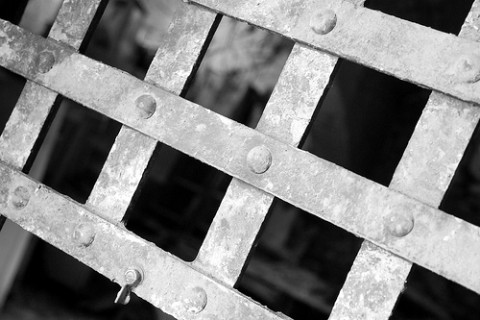Cell groups: Inmates and seminarians study together
The class on spiritual autobiography was examining the inside cover of a narrative written by a former slave, Olaudah Equiano, in the 18th century. One of the students, Garcia Burnette, noticed that the page included a regal portrait of Equiano holding a Bible open to the book of Acts. He suggested that this could be a reference to Acts 12, in which Peter is delivered from Herod's prison. Burnette also noticed that another edition of the book portrayed Equiano in a red gown. "The red is like scarlet," he said, "a color of power."
"That's very insightful," said Willie Jennings, a professor at Duke Divinity School who was leading the class that day. "All of this is purposeful. [Equiano] wants to make sure he is interpreted as a full equal in society."
"Right," said Burnette. "Not just a slave or a savage."
Burnette was not the usual attentive seminary student, nor was this discussion taking place in the usual seminary classroom. He was a prisoner, incarcerated for breaking and entering, and the class was held in the Durham Correctional Center. Through a program at Duke Divinity School, Burnette was engaged in theological study alongside seminary students.
Read our latest issue or browse back issues.
The idea of having divinity students taking classes with prisoners, reading and discussing the same material, emerged a decade ago at Vanderbilt Divinity School in Nashville through the efforts of prison activist Harmon Wray. Since then, Drew Theological School in New Jersey, Union Theological Seminary in New York and Duke Divinity have developed similar programs.
Duke's Prison Studies certificate program for M.Div. students requires participants to take field trips to prisons for a course on restorative justice, complete a field-education placement in a prison-related ministry or advocacy program and take a class with inmates in a local lockup.
At Drew, the Partnership for Religion and Education in Prison offers courses for seminarians and prisoners that are taught inside the prison.
In Nashville, through a partnership with the national Inside Out Prison Exchange program, the Vanderbilt Divinity courses have expanded to include faculty and undergraduates from Vanderbilt, Western Kentucky, Belmont and Lipscomb universities and American Baptist College.
"This is one of the growing edges of the church's ministry," said Kenneth Carder, a retired Methodist bishop and a friend of Wray's, who brought the idea to Duke in 2004.
Vanderbilt was not the first seminary to offer graduate-level theological education in a prison. New York Theological Seminary has been offering courses and master's degrees to inmates at Sing Sing prison since the 1980s. Since the mid-1990s, New Orleans Baptist Theological Seminary has awarded about 200 associate or bachelor degrees in Christian ministry to inmates in prisons all over the South.
What's different about the programs at Vanderbilt, Drew and Duke is that seminarians don't just minister to prisoners, they learn in company with them.
"It's a two-way street," said Douglas Campbell, a New Testament scholar who directs the Prison Studies program at Duke. "The wisdom that comes from incarcerated people is often very grounding and helpful to those of us who are rushing around on the outside for things that don't really matter."
At Duke, the prison program is spearheaded by Project TURN, in partnership with the Chaplaincy Services of the North Carolina Department of Corrections. Project TURN is a program of the School for Conversion at Rutba House in Durham, a community founded by Jonathan Wilson-Hartgrove and other Duke Divinity alumni. Many Project TURN courses are taught by Duke faculty, and the university offers credit as long as a faculty member approves a syllabus.
The spiritual autobiography course was taught by Isaac Villegas, a Duke divinity graduate and pastor at Chapel Hill Mennonite Fellowship. He pointed out to the class that more black men are in U.S. prisons today than were slaves at the time of the Civil War. That comment prompted a discussion on the differences between slavery and incarceration.
Inmates work for slave wages, contended one prisoner. "I think I'd rather had a good whipping than be in prison as long as I have," he added.
Burnette observed that unlike a slave, such as Equiano, "I can't buy my freedom."
Villegas said, "We don't know what it's like to live in prison. We need you to teach us."
Amey Adkins took the first Project TURN class taught at the North Carolina Correctional Institution for Women in Raleigh when she was in her final year at Duke Divinity School. She had been reading and citing prison scholarship as she studied the theological implications of global sex trafficking.
"I was using all of these analogies of people in prison to make these claims, and I didn't know anybody in prison," she said. "I suddenly felt compelled to learn more and care more about what was going on."
At the first class in the women's prison, Adkins met "Tracy," who told her she looked like her daughter. The two women shared an African-American heritage. Adkins felt the sting of separation when Tracy and the other prisoners had to exit one door of the prison classroom while the visitors used another door. It reminded her of the separate bathrooms and water fountains of the Jim Crow South.
"This [prisoner] is someone's mother, daughter, sister, cousin, aunt, friend," Adkins realized. "This wasn't someone who could be labeled for a drug problem or for petty theft. This was a human being, and she was someone I liked, and she was someone who was a friend.
"The relationships and the bonds that I formed . . . remind me of my own fragility. Under different life circumstances, we could be sitting in different chairs, we could be wearing different clothes." Adkins, who is pursuing a Ph.D. focused on theological storytelling, has become one of the teachers in Project TURN.
"In a world where so many people are or will be incarcerated, I think it's a travesty not to engage" with prisoners, Adkins said. "If congregations knew the immense gifts and talent and the beautiful faces of Jesus that are locked behind bars and if the church knew that this missing arm of the body of Christ was so close, I think we would ask more questions."
Christians generally view imprisonment as a necessary punishment for a crime, but a growing number of educators and prisoner advocates argue that many of the people who are in prison don't belong there. Janet Wolf, professor of church and society at the historically black American Baptist College in Nashville, believes that prisons represent institutionalized racism. She notes that blacks make up about 13 percent of the U.S. population but 40 percent of its prison population. Wolf and other scholars trace racial disparities in the use of prisons from the time of slavery—through the post-Reconstruction use of "black codes" that sent freed slaves to prison for "crimes" like loitering, to the creation of laws targeting black activists during the civil rights era, to the methods of the war on drugs initiated in the 1970s. Today more than 250 out of every 100,000 black adults are sent to prison on drug charges, a rate ten times higher for blacks than it is for whites, according to Human Rights Watch.
If people with drug addictions have the money, they usually receive treatment, said Wolf. But "if people don't have money, and they can't access health-care treatment, then suddenly addiction is a crime, and [they] go to prison for a very long time.
"There is no reason to incarcerate most of the folks that we've got in the prison," she said. "If most people would go into the prison and just listen and learn, then tomorrow we would change the criminal justice system."
In Villegas's class, Burnette sees himself in the shoes of the former slave Equiano. He makes no excuses for his crime but relates his experience to that of people of color who've been colonized, exploited, judged inferior and unjustly imprisoned.
"We're highly educated people," he says, describing the villagers from whom Equiano was stolen. "You just don't understand our language and our culture."
Carder hopes that the seminary prison programs will encourage more students to become prison chaplains and inspire pastors and congregations to make visiting prisoners a priority. He said much of the New Testament was written from or to prisoners or to those living on the margins of society and can't be fully understood apart from that context.
"Experiences within the prisons and among those who are more marginalized in our society is significant in the formation of leadership in the church," Carder said. "How do we help pastors and congregations see that the prisons and jails in their communities are part of their parish? Near almost every prison and jail we have churches, but it's rare when those churches actually interact with the people. That needs to be changed."
Said Campbell: "Most Americans just have no idea what a prison is like and how many of them there are and how they run and how prisoners are treated. You can talk about it and read books about it, but there is no substitute for going into one and hearing the door shut behind you, and seeing all the razor wires and all the guards with guns. That just has an impact that's more powerful than anything else. The reading that [students are] doing in class suddenly has this existential dimension that it didn't have before."







